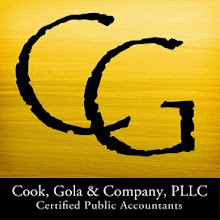There has been an outcry from the taxpaying American public over the quality of work being done by some tax preparers. As a result, the IRS has become concerned that too many returns are being prepared incorrectly by paid professionals. The IRS is taking steps to strengthen regulation of the tax preparation industry. Here are some of the proposed steps IRS is planning to implement over the next two to three years:
· Registration with IRS:
Each paid tax preparer will be required to obtain a Preparer Taxpayer ID Number (PTIN) from the IRS. Preparers will also be required to register electronically and pay a user fee with the IRS. The registration and fee would need to be renewed every three years.
· Competency testing:
Any paid preparer who is not already a licensed professional will be required to take a competency test to be allowed to prepare returns. CPAs and attorneys, because of their state licenses, would not be subject to these requirements. Current rules do not establish any sort of standard for who may be a paid preparer.
There are three levels of certification planned: one for individuals without businesses, one for individuals with businesses (self employed) and a third for corporate and partnership returns. Preparers would not be ‘grandfathered in’ under this rule – every non-licensed preparer who wishes to continue preparing returns would be required to register and take the competency exam.
· Continuing Education:
IRS will require all preparers to complete 15 hours of continuing education each year. This will include a mandatory 2 hours on preparer ethics and another 3 hours on tax law updates. The other 10 hours can be any topic of choice. CPAs and attorneys already complete far more hours than this as part of their state licensing requirements, so they are also exempt from this rule.
· Tax Compliance:
All preparers will be subject to annual verification by the IRS of their personal and business tax filings. While details are not yet available, preparers will presumably be expected to be current on their personal filings and not be delinquent in their personal or business taxes.
· While it hasn’t been specifically addressed by the IRS, there have also been rumblings from Capitol Hill about the legality of “refund anticipation loans” (RALs). For those who don’t know, a RAL is when the paid preparer advances the taxpayer a loan for his eventual tax refund – less a hefty fee. The taxpayer signs an agreement giving the preparer the right to collect the eventual refund. The end result is a seven to ten day loan from the preparer that ends up costing the taxpayer as much as 400% in annualized interest. These types of loans are the “bread and butter” of many large tax preparation franchises, but there are those who feel that the practice is predatory and want to see it banned.
The bottom line is that tax preparers are about to find themselves under a lot more scrutiny by the IRS – not to mention the increased cost of registration and education. As a result, you may see fewer of the “chain” tax preparation sites (Block, Jackson Hewitt, Liberty), and certainly fewer of the local places, since they rely so heavily on less-educated staff and lower overhead than CPAs do. You will, however, also probably see higher preparation fees as firms pass these additional expenses along to the consumer.
In the end, we believe these new regulations are a good thing. Income taxes are too complicated and too important to be trusted to just anyone who calls themselves a “tax preparer”. It’s time some standards were put in place.
--Dan Musick is the Tax Services partner with Cook & Associates, a public accounting firm offering a full range of accounting, assurance, and tax services to clients from offices in San Marcos and San Antonio, TX
Use Tech to Make Employees Happier
10 hours ago



No comments:
Post a Comment